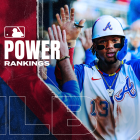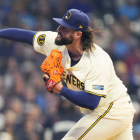The New York Mets have won six in a row and nine of their last 10, a run that has enabled them to re-enter the wild-card race. Coming into Friday, they're a half game behind the Milwaukee Brewers for the second berth in the play-in game -- tied with both the St. Louis Cardinals and Philadelphia Phillies. The Mets are also 2 1/2 games back of the Washington Nationals -- who they'll just so happen to play three times this weekend, as our Dayn Perry noted elsewhere.
The Mets, to their credit, have spent the week looking for ways to upgrade their roster -- even after the passing of the trade deadline. Already this week the Mets have signed reliever Brad Brach, who was released by the Chicago Cubs. And they've now agreed to sign former San Francisco Giants second baseman Joe Panik, per the team:
We have signed free agent infielder Joe Panik (@JoePanik) and designated Adeiny Hechavarría for assignment. #Mets pic.twitter.com/RDsCHpBz9p
— New York Mets (@Mets) August 9, 2019
Obviously Brach and Panik have warts -- they were released by competitive teams for a reason -- but the Mets have few other means to adding talent. Their lack of organizational depth is a well-known flaw, and the single trade deadline means there are few external routes to adding talent the rest of the way. One of them is signing released players for the league minimum.
Brach posted a 6.13 ERA (73 ERA+) in 39 2/3 innings with the Cubs. His main issue was command, as he permitted 28 walks, or more than six per nine innings. To Brach's credit, he did miss bats with his mid-90s fastball and splitter combination, and his strike and zone rates remain reasonably close to last year's figures -- when he walked four per nine. Realistically, the Mets aren't hoping for a return to old form so much as him being good enough to edge out the worst reliever on their roster. Given their bullpen ranks 27th in ERA, that seems doable.
Panik could help cover at second base during Robinson Cano's absence. The Mets have used Luis Guillorme and the now-designated Adeiny Hechavarria there their last three games. The sum of their OPS+ (in nearly 200 plate appearances, mind you) is 66. Panik was waived by the Giants after they acquired Scooter Gennett at the deadline. Yet even at his worst, he still managed a 70 OPS+.
Panik's game is straightforward and centers on his bat-to-ball skills. He rarely strikes out, and has fanned just 9.4 percent of the time over his career. The catch is that Panik's brand of contact is seldom of the hard variety. He's not likely to offer much in the power department, and below-average exit velocities have led to a .245 average over the past season-plus. Again, though, the goal is: better than what the Mets have, if not necessarily good on its own.
As easy as it is to mock the Mets for snatching up other contenders' rejects, what they're doing makes a lot of sense -- even if it proves to not be enough for them to reach the postseason.






















